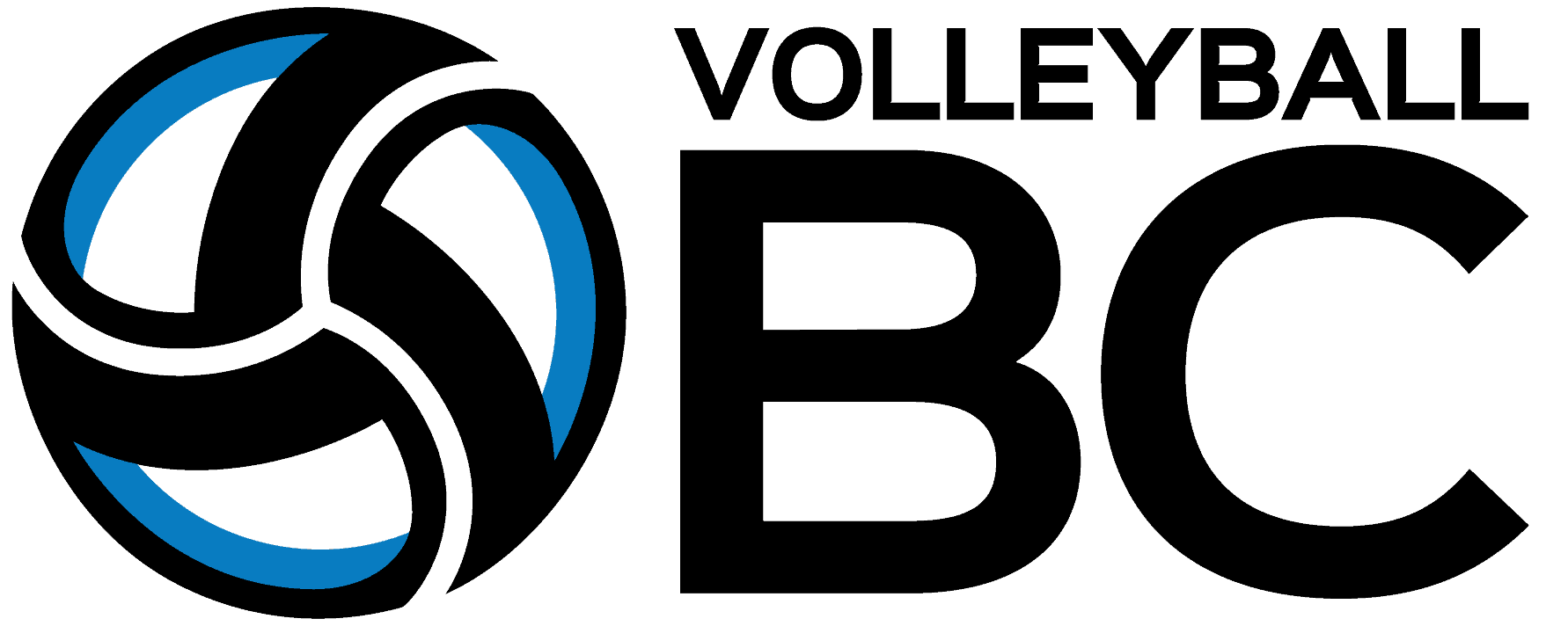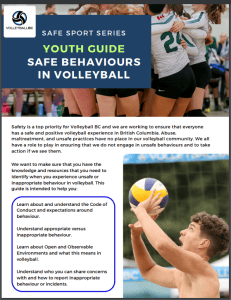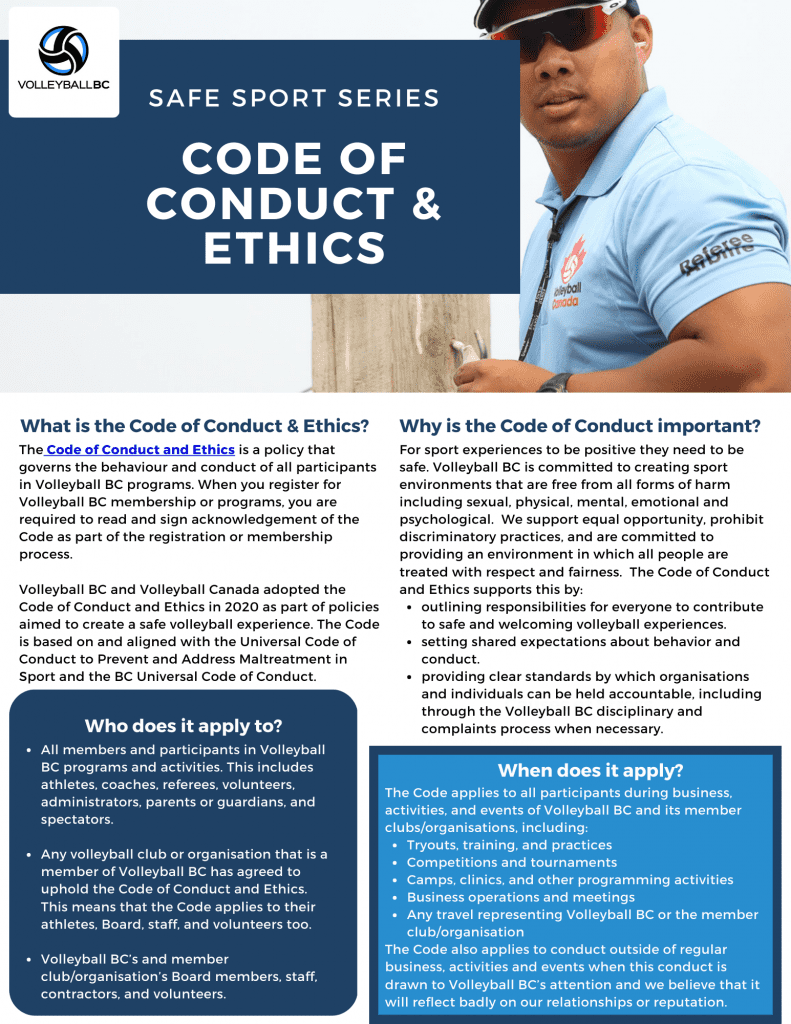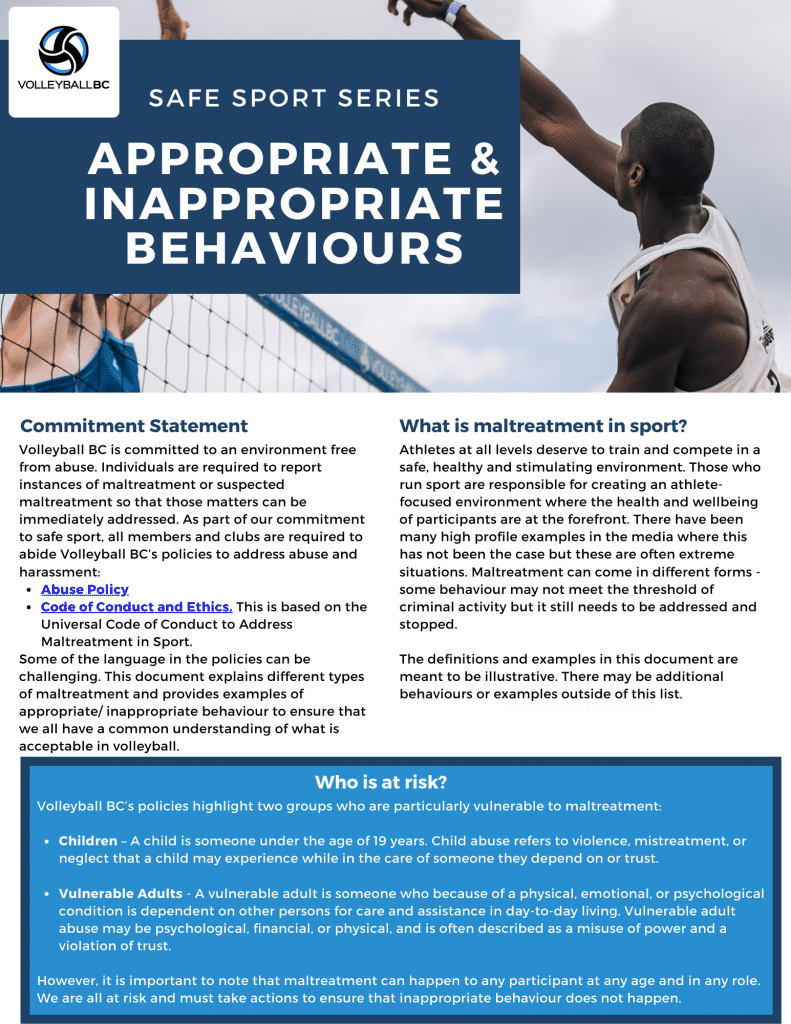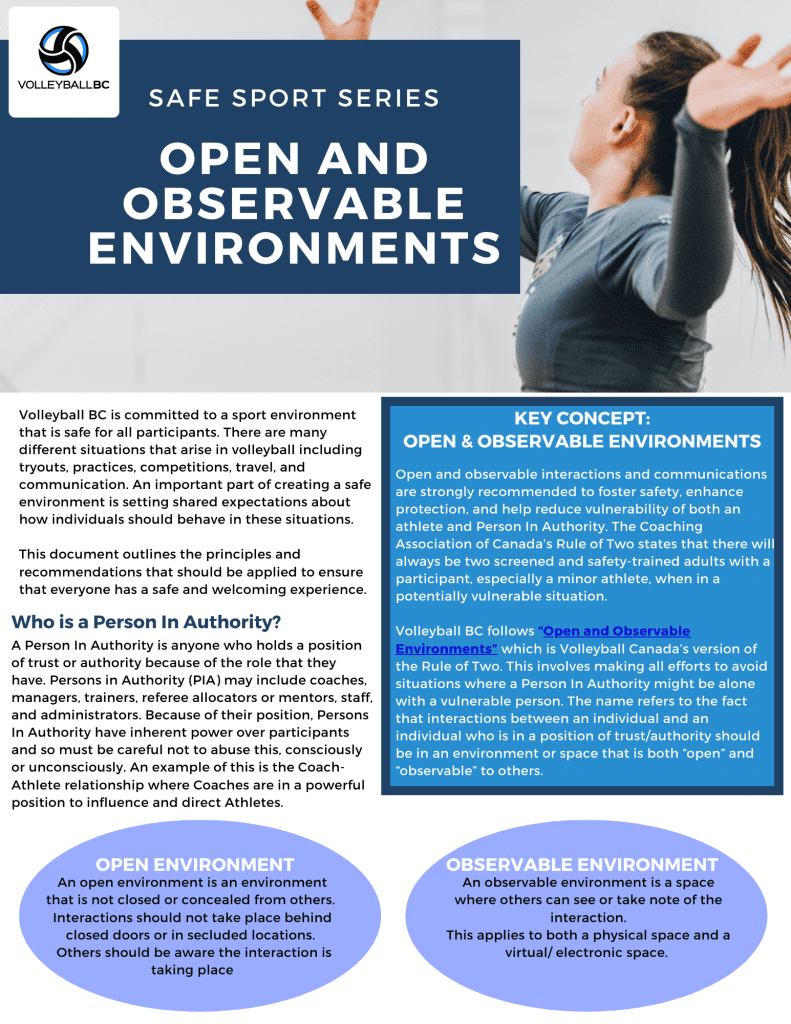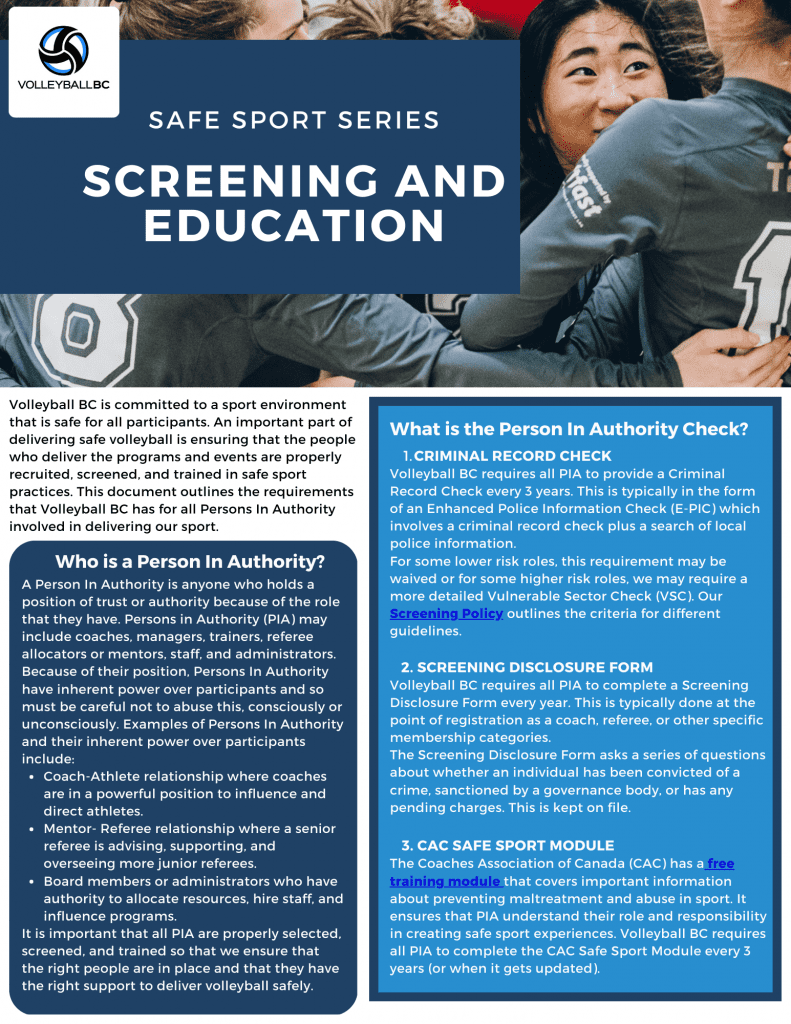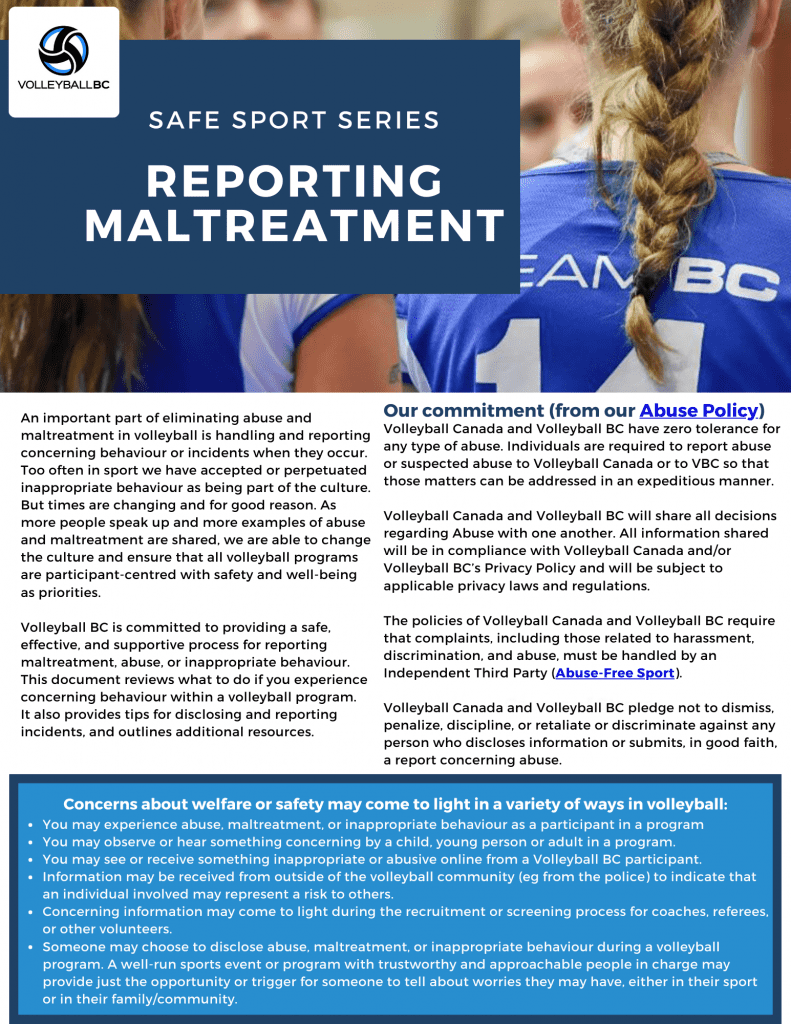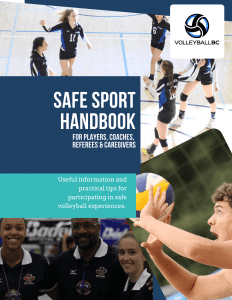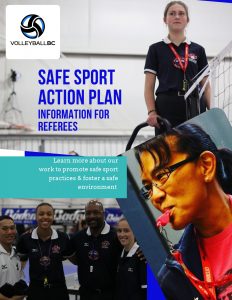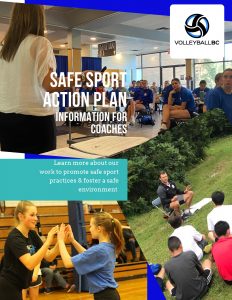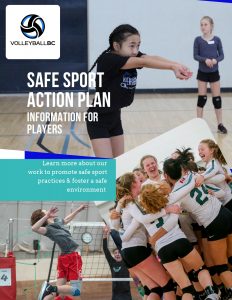**NEW** Youth guide to safe Behaviours in volleyball
We’re proud to introduce our new Youth Guide to Safe Behaviours in Volleyball. Safety is a top priority for us – and we all have a role to play in ensuring that we do not engage in unsafe behaviours.
We want to make sure you have the information you need to identify when you experience unsafe or inappropriate behaviour in volleyball. This guide is intended to help you:
- Learn about and understand the Code of Conduct and expectations around behaviour.
- Understand appropriate versus inappropriate behaviour.
- Learn about Open and Observable Environments and what this means in volleyball.
- Understand who you can share concerns with and how to report inappropriate behaviour or incidents.
Short on time? Check out our Athlete Handout on Safe Sport as a starting point!
safe sport series
We’ve developed this series of handouts on important topics for you to keep yourselves and others safe from abuse, maltreatment, and inappropriate behaviour. Click on one of the images below to download and read a printable handout with all the key information you need to know.
safe sport handbook FOR MEMBERS
All the different information about safety can be confusing so we have decided to put it together for you in one place! This Safe Sport Handbook outlines the main requirements and measures that Volleyball BC has in place to protect participants and respond to maltreatment and inappropriate behaviours. It covers topics such as:
- Our Code of Conduct and what it means
- How to report behaviour that is not in line with our Code of Conduct
- What does appropriate and inappropriate behaviour look like in volleyball?
- Screening and education requirements for leaders in volleyball
- Useful information and resources
In each section you will find useful information and practical tips about how the topic is relevant in volleyball.
Download and save this Handbook as your reference tool to ensure that volleyball is safe and enjoyable.
making a complaint
Despite our best efforts, sometimes things happen. Volleyball BC has a Code of Conduct that every participant agrees to uphold when they register. This governs Volleyball BC’s events, activities, and member clubs.
We have a process in place to address issues or behaviours that contravene our Code of Conduct. This flowchart shows the process:
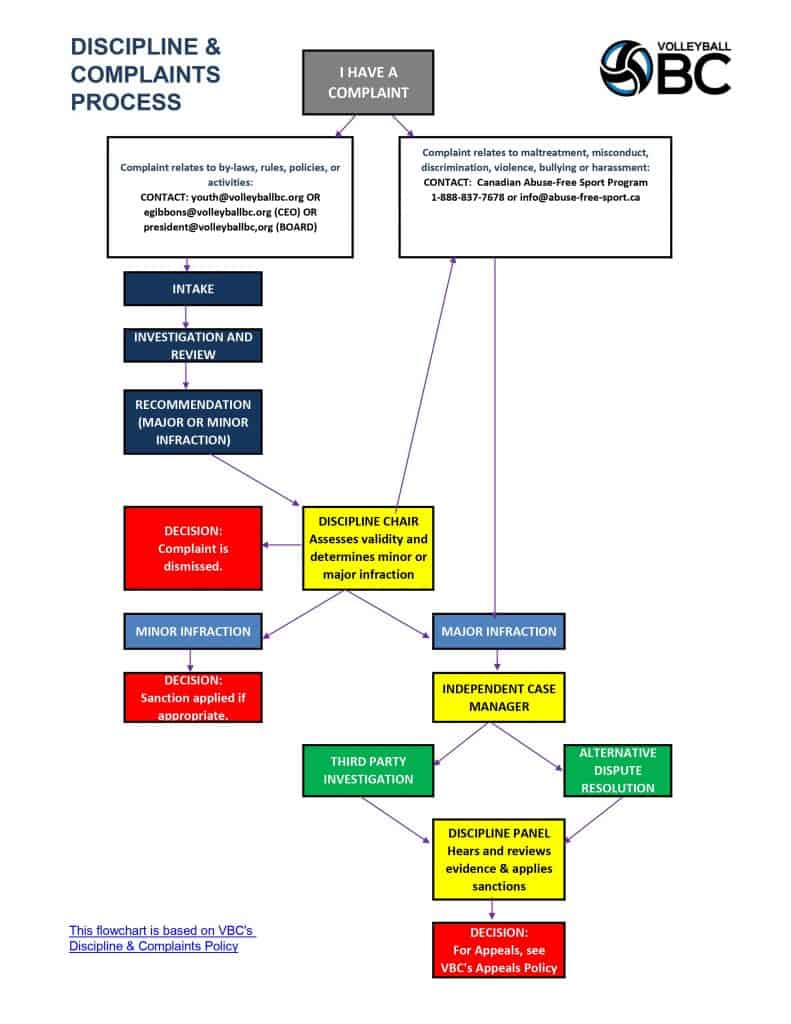
REPORTING ABUSE
Volleyball Canada and Volleyball BC have zero tolerance for any type of abuse. Individuals are required to report abuse or suspected abuse to Volleyball Canada or to VBC so that those matters can be addressed in an expeditious manner. You can report an issue in the following ways:
Volleyball BC has an independent third-party to review safe sport complaints. This is provided through the Abuse-Free Sport Program that offers a centralized “one stop shop” for managing complaints of abuse and maltreatment. Where there are admissible allegations of abuse, harassment or discrimination, the Office conducts independent investigations and recommends sanctions against individuals who violate our Code of Conduct.
Contact Abuse-Free Sport – 1-888-837-7678 or [email protected] or http://abuse-free-sport.ca/en/
The helpline will provide you with advice, guidance and resources on how to proceed/intervene appropriately in the circumstances.
Any VBC Member may report to the VBC Head Office any complaint of an infraction by a Member. Such a complaint must be signed and in writing and must be filed within fourteen (14) days of the alleged incident. If a complaint is related to abuse or suspected abuse, VBC will refer the complaint to the Abuse-Free Sport program. You can report any complaints to Volleyball BC at [email protected]
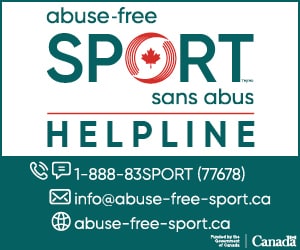
EDUCATION AND TRAINING
Volleyball Canada and Volleyball BC require that all individuals involved with the sport across the country take the FREE 90-minute safe sport training module, available via the Coaching Association of Canada website. This includes coaches, referees, parents of youth athletes, high performance staff and contractors, officials; and all administrative staff and volunteers whether they may have direct contact with athletes or not.
To take the training, visit www.safesport.coach.ca and create an account in “The Locker” (even if you are not a coach).
As part of Volleyball BC’s commitment to Safe Sport, our staff and Board have also completed Commit to Kids training.
SCREENING
Screening personnel and volunteers is an important part of providing a safe sporting environment and has become a common practice among sport organizations that provide programs and services to the community.
Volleyball BC’s Screening Policy and Persons In Authority Checklist outlines the requirements for all participants involved in volleyball in BC. Mandatory screening is required for all individuals in leadership roles who work directly with athletes. This includes all Staff, Directors, Chairs, Coaches, Managers, Referees, Chaperones and persons who manage finances.
You can find more information about our Screening Policy and Screening Disclosure Form here.
GOVERNANCE AND POLICIES
Volleyball BC has adopted several policies aimed at addressing the maltreatment of individuals in sport. These policies align with national and provincial policies including the BC Universal Code of Conduct. Our relevant policies include:
A full list of VBC policies can be found here.
what's safe sport?
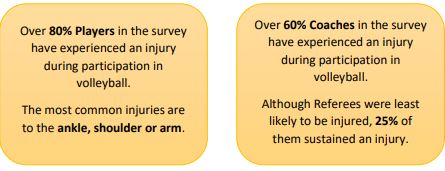

Positive sport experiences require participants to be safe and free from physical, emotional and mental harm. The devastating repercussions of bullying, harassment and abuse in sport have been well-documented. In a recent survey, our members told us that safety was a top priority:
- The mental, emotional and social well-being of players was listed by youth and adults in the top 4 priorities for Volleyball BC.
- Ensuring safety standards was ranked #2 as a priority for developing volleyball in British Columbia.
- Over 95% of respondents thought that coaches should be background checked and certified. Over 90% felt the same about referees.
Volleyball BC is committed to a sport environment free from abuse that is safe for all participants. Safe sport practices are the responsibility of everyone, including coaches, parents/guardians, athletes, referees, club administrators and volunteers.
what is volleyball bc doing about safety?
Participant safety is a central part of our 2021-2024 Strategic Plan. One of our goals is “To foster a safe environment” which is supported by a key initiative to “become a leader in safe sport practices and implementation”.
Over the last year, Volleyball BC has been gathering information, best practice, and research about safety. Work included:
- Creating a Safe Sport Working Group with representatives from
- across the sport
- Surveying our membership about their experiences
- Conducting focus groups with Team BC athletes
- Reviewing best practice and assessing priorities in our sport
In March 2022, Volleyball BC’s Board adopted a Safe Sport Action Plan which was the culmination of this research.
safe sport action plan
The Safe Sport Action Plan outlines our actions in 4 areas of safety:
- Concussion
- Physical Injury
- Abuse and Maltreatment
- Mental Health
We are committed to sharing our progress against these areas on a regular basis. We have also produced guides to the Action Plan specific to players, coaches and referees which can be found below.
Click here to read our Safe Sport Action Plan – Executive Summary.
Click here to read the full Safe Sport Action Plan
Click here to review the findings of our 2021 study of Safety in Volleyball in BC.
ADDITIONAL RESOURCES & HELPLINES
external organisations
- B.C. Helpline for Children – a confidential toll-free phone line for children and youth wanting to talk to someone – is 310-1234 (no area code required).
- VictimLinkBC – a toll-free, confidential, multilingual telephone and online service available across B.C. 24 hours a day, 7 days a week which provides information and referral services to all victims of crime and immediate crisis support to victims of family and sexual violence.
- Resilience BC – Anti-Racism Network provides information about how to report incidences of racism and hate crimes if you are a victim or witness such incidences.
volleyball bc information
- Mental Health Toolkit
- Mental Health in Volleyball
- Volleyball BC’s tips for handling Performance Anxiety in Competitions:
Players – Performance Anxiety
Coaches Handout – Performance Anxiety
Referee Handout – Stress in Tournaments - Concussion and physical injury
